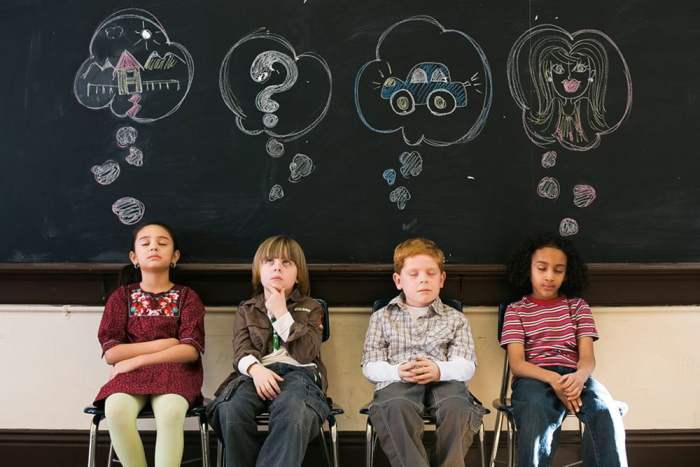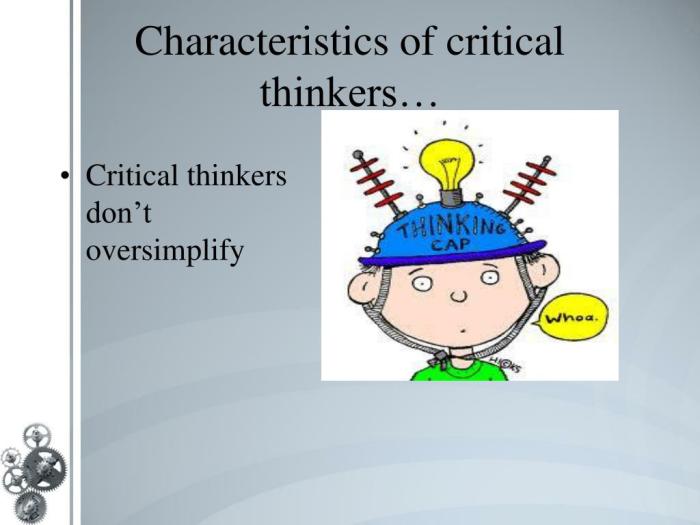Critical thinkers possess the following characteristics except for a select few that set them apart. These individuals navigate cognitive complexities, embrace open-mindedness, wield analytical prowess, harness communication skills, cultivate intellectual humility, and engage in metacognition. Yet, certain attributes elude them, shaping their unique perspectives and approaches to problem-solving.
This discourse delves into the defining traits of critical thinkers, highlighting the characteristics that set them apart from the ordinary. By examining these exceptions, we gain a deeper understanding of the complexities of critical thinking and its multifaceted nature.
Cognitive Flexibility
Cognitive flexibility is the ability to adapt to changing circumstances and viewpoints. It involves being able to think outside the box and consider different perspectives, even if they contradict one’s own beliefs.
Critical thinkers possess cognitive flexibility, which enables them to approach problems from multiple angles and find creative solutions. They can also adjust their strategies when faced with new information or unexpected obstacles.
Role in Problem-Solving and Decision-Making
- Allows critical thinkers to consider various options and approaches.
- Facilitates the generation of innovative solutions by breaking away from conventional thinking.
- Enables critical thinkers to adapt to changing circumstances and make informed decisions.
Open-mindedness
Open-mindedness is the willingness to consider new ideas and perspectives, even if they challenge one’s own beliefs. It involves being receptive to different viewpoints and seeking out diverse sources of information.
Critical thinkers are open-minded and approach new ideas with curiosity and a desire to learn. They recognize that their own knowledge and beliefs are limited and that there is always more to discover.
Benefits and Challenges, Critical thinkers possess the following characteristics except
- Benefits:
- Promotes intellectual growth and learning.
- Enhances critical thinking skills by exposing individuals to different perspectives.
- Reduces bias and prejudice.
- Challenges:
- Can be difficult to challenge one’s own beliefs.
- May lead to confusion or uncertainty when faced with conflicting information.
Analytical Skills: Critical Thinkers Possess The Following Characteristics Except

Analytical skills involve the ability to break down complex information into smaller parts, identify patterns, and draw logical conclusions. Critical thinkers use analytical skills to evaluate arguments, solve problems, and make informed decisions.
Analytical methods used by critical thinkers include:
- Deductive reasoning:Drawing conclusions from general principles.
- Inductive reasoning:Forming generalizations based on specific observations.
- Hypothesis testing:Developing and testing theories to explain phenomena.
- Argument analysis:Evaluating the validity and soundness of arguments.
Contribution to Problem-Solving and Decision-Making
- Allows critical thinkers to identify the root causes of problems.
- Facilitates the development of effective solutions by breaking down complex issues.
- Enables critical thinkers to make informed decisions based on evidence and logical reasoning.
Communication Skills
![]()
Communication skills are essential for critical thinkers to effectively convey their ideas and arguments. They involve the ability to express oneself clearly, persuasively, and respectfully.
Critical thinkers use communication skills to:
- Present their findings and conclusions.
- Engage in constructive dialogue and debate.
- Influence others and promote their ideas.
Effective Communication Strategies
- Clarity:Using precise language and avoiding jargon.
- Conciseness:Delivering messages in a succinct and organized manner.
- Persuasiveness:Supporting arguments with evidence and logical reasoning.
- Respect:Listening attentively to others and considering their perspectives.
Intellectual Humility

Intellectual humility is the recognition of the limits of one’s own knowledge and understanding. It involves being open to learning from others and acknowledging that one does not have all the answers.
Critical thinkers possess intellectual humility, which allows them to:
- Approach new ideas with a willingness to learn.
- Recognize their own biases and limitations.
- Be open to feedback and constructive criticism.
Benefits of Intellectual Humility
- Promotes intellectual growth and learning.
- Reduces the risk of overconfidence and bias.
- Fosters a collaborative and open-minded learning environment.
Metacognition

Metacognition is the ability to reflect on one’s own thinking processes. It involves being aware of one’s strengths and weaknesses, and being able to monitor and regulate one’s thinking.
Critical thinkers use metacognition to:
- Identify and address biases in their own thinking.
- Develop effective learning strategies.
- Monitor their progress and make adjustments as needed.
Benefits of Metacognition
- Improves critical thinking skills by enabling individuals to identify and correct errors in their thinking.
- Promotes self-awareness and self-regulation, leading to improved learning outcomes.
- Enhances the ability to transfer knowledge and skills to new situations.
Q&A
What is the primary characteristic that sets critical thinkers apart?
Critical thinkers are distinguished by their ability to think flexibly, adapting to changing circumstances and perspectives.
How do critical thinkers approach new ideas and information?
Critical thinkers embrace open-mindedness, approaching new ideas with curiosity and a willingness to consider alternative viewpoints.